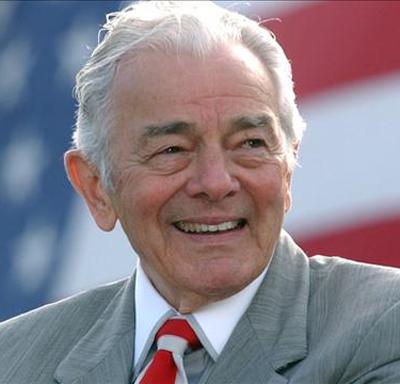Al Neuharth: Founder of USA Today, Freedom Forum and the Newseum
By • May 9, 2013 0 1551

Like him or not, Al Neuharth was a newspaper mogul and tycoon, a media giant and innovator right up there with Ted Turner and maybe even the likes of Hearst and Pulitzer. He knew he wasn’t liked by everybody and probably didn’t want to be: his memoir was entitled “Confessions of an S.O.B.,” a description any number of people in the business would argue with.
What he did was, he expanded Gannett Newspapers, from which he founded USA Today, a national daily newspaper, full color and full of pictures, shorter stories, a four-section paper that divided itself into news, style, sports and business. The newspaper was not the place for in-depth reporting on politics or policy issues.
Neuharth, who died at 89 April 19, insisted he was giving people what they wanted and creating an efficient product by cutting costs drastically. A lot of the heavyweights of the time, especially Ben Bradlee at the Washington Post, scoffed at the idea. It was probably fair to say that USA Today, which was called “McPaper” by many, initially had more fluff than any other paper in the country, not counting the National Enquirer. But it also changed the publishing world drastically.
While many newspaper buffs criticized USA Today for its lack of substance, people bought it to the tune of more than one million copies, a circulation figure it still holds today. It was a newspaper that was trying to look, feel and read like a local news television broadcast—accessible, friendly, punchy, and with few serious thoughts in its head.
The first edition on September 15, 1982, cost 25 cents and gave readers an idea about what USA Today was about. The top two stories were about the death of Princess Grace (Kelly) of Monaco, a blonde, beautiful former movie star from Philadelphia who had married the Prince of Monaco, and a plane crash in Minnesota which killed 55 people. You had to go to the sidebar on the left to find out that the President of Lebanon had been assassinated, a major development which resulted in the massacre at the Palestinian refugee camps of Sabra and Shatila.
USA Today remained popular and has grown as a newspaper with a sturdy journalistic reputation. Neuharth went on to found the Newseum and the Freedom Forum, an institution dedicated to the defense of free speech all over the world. Today, it occupies a prominent space on Pennsylvania Avenue.
Neuharth was colorful, outspoken and not in the least bit shy. But he was never anything less than a serious man. If the publishing industry did not realize at the time that the real danger to its very existence would not come from television or USA Today but the Internet—a hard thing to foresee. Today, USA Today still seems to be thriving or holding steady in a world where the media has undergone tumultuous changes, and newspapers disappear almost weekly.

